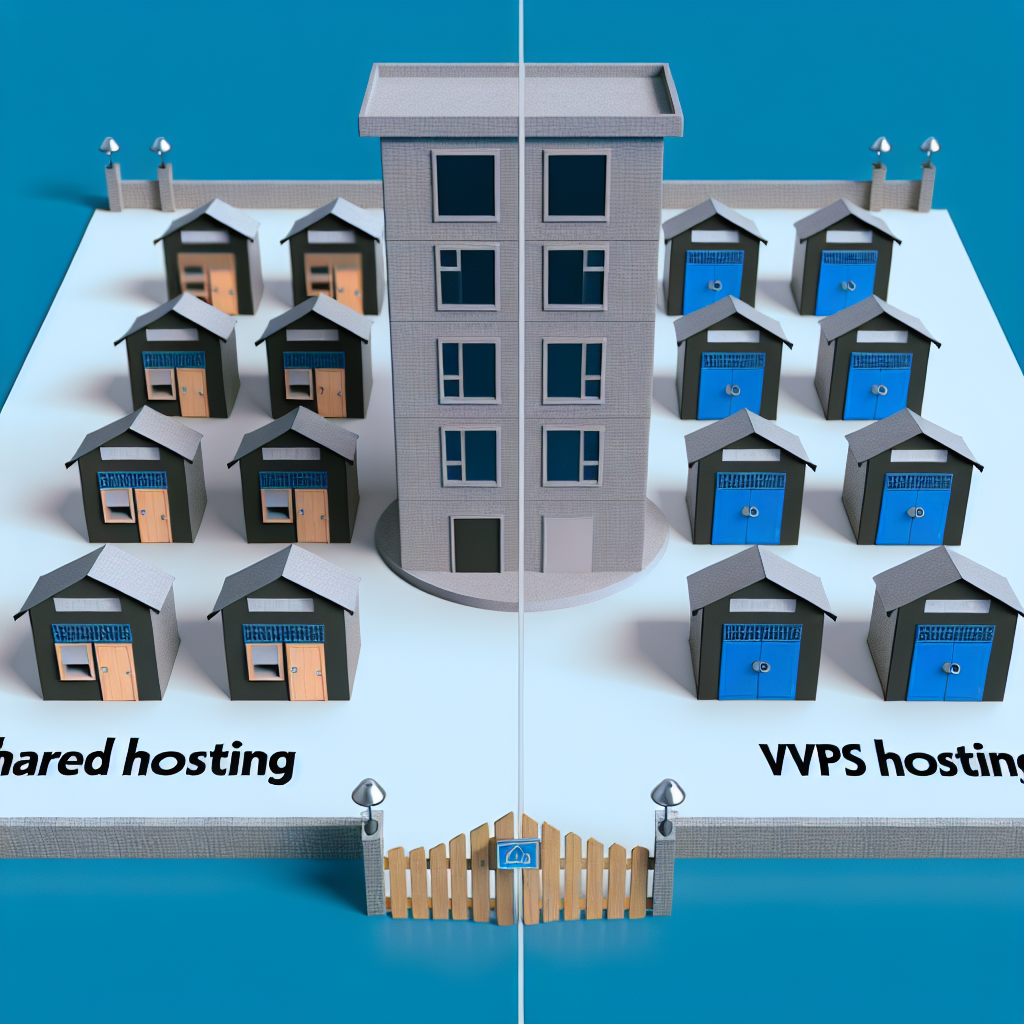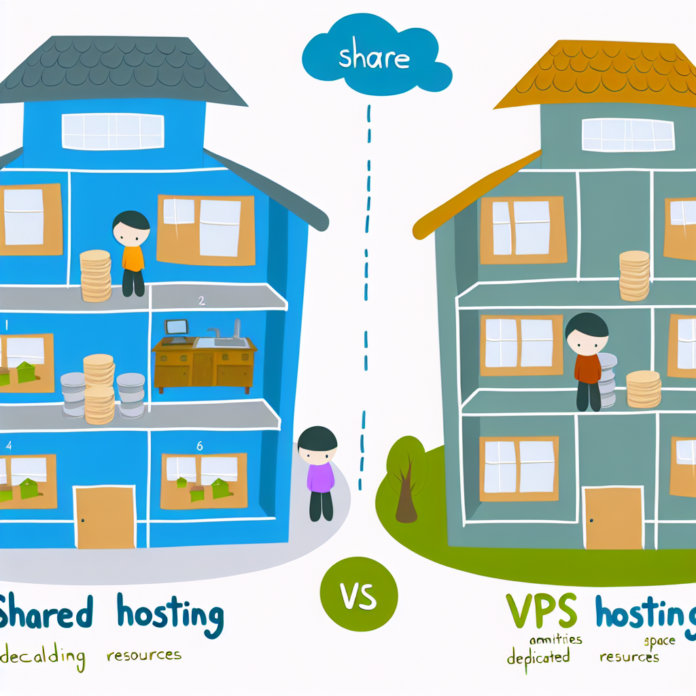Choosing the right hosting solution is crucial for the success of any website. In today’s digital landscape, where over 1.7 billion websites vie for the attention of internet users, the decision between shared hosting and VPS hosting can significantly impact your site’s performance, security, and scalability. With so many options available, it’s essential to understand the key differences between these two popular hosting solutions. Our article, “Shared Hosting vs. VPS Hosting: Key Differences Explained,” aims to demystify these options, providing you with the insights needed to make an informed choice.
Throughout this article, we will delve into the nuances of Shared Hosting vs. VPS Hosting: Key Differences Explained, examining aspects such as cost, resource allocation, performance, security, and ease of management. Whether you are launching a new website or considering upgrading your current hosting setup, understanding these critical differences will guide you toward the hosting solution best suited to your site’s needs and your budget. Stay with us as we explore everything you need to know about Shared Hosting vs. VPS Hosting: Key Differences Explained, ensuring your website is positioned for success in the competitive online arena.
Understanding the Basics of Shared Hosting vs. VPS Hosting: Key Differences Explained

To navigate the complex world of website hosting, it’s pivotal to start by breaking down the basics of Shared Hosting vs. VPS Hosting: Key Differences Explained. This foundational knowledge is not just a starting point but a critical step in choosing a hosting solution that aligns with your website’s needs, performance expectations, and growth potential.
What is Shared Hosting?
Shared Hosting is akin to living in an apartment complex where resources such as water, electricity, and common areas are shared among all residents. In the digital realm, Shared Hosting involves multiple websites residing on a single server, sharing the server’s resources such as CPU, memory, and disk space. This type of hosting is particularly attractive for new website owners due to its cost-effectiveness and simplicity. However, the shared environment can lead to limitations in performance, especially as a website grows or experiences traffic spikes.
What is VPS Hosting?
VPS Hosting, or Virtual Private Server Hosting, offers a middle ground between Shared Hosting and dedicated hosting services. Think of it as owning a condo where you have dedicated resources that you don’t have to share with your neighbors. A VPS hosts fewer websites on the same physical server, but each website is allocated its own set of resources thanks to virtualization technology. This setup offers better control, improved performance, and greater scalability than Shared Hosting, making it suitable for websites with higher traffic volumes or specific performance requirements.
Key Differences at a Glance
- Resource Allocation: Shared Hosting pools resources among multiple websites, which can affect performance during peak times. VPS Hosting provides dedicated resources, offering better and more consistent performance.
- Security: Shared Hosting presents a higher risk of security breaches due to the shared environment. VPS Hosting, with its isolated containers, offers enhanced security features and customization options.
- Scalability: Scaling a website on Shared Hosting is limited and often requires migrating to a higher plan or a different hosting type. VPS Hosting, on the other hand, allows for easier scalability, accommodating growth without the need for migration.
- Control and Customization: Shared Hosting offers limited control over server settings and software installations. VPS Hosting gives users root access and the freedom to customize their server environment according to their needs.
Understanding these basics lays the groundwork for making an informed decision between Shared Hosting and VPS Hosting. Each has its advantages and limitations, and the choice largely depends on your website’s size, budget, and long-term growth expectations. As we unravel the intricacies of Shared Hosting vs. VPS Hosting: Key Differences Explained, it becomes clear that the right hosting solution is not just about cost but aligning with your website’s performance and scalability needs.
Cost Analysis: Shared Hosting vs. VPS Hosting

When embarking on the journey of creating or upgrading a website, one of the first decisions you’ll face is choosing between shared hosting and VPS hosting. This choice is pivotal as it can influence not just the performance and security of your site but also its cost-efficiency. Understanding the cost implications of Shared Hosting vs. VPS Hosting: Key Differences Explained is essential for any website owner, from small bloggers to large-scale business operators. Let’s dive into how these hosting options weigh against each other in terms of expenses to help you make a well-informed decision.
Initial Investment and Monthly Fees
Shared Hosting: This is often the go-to option for newcomers and those with limited budgets. Shared hosting is cost-effective because you share a server with multiple other users, which significantly reduces the cost of maintenance and server operation. Prices can start as low as a few dollars per month, making it an attractive option for those just starting out or with minimal website requirements.
VPS Hosting: Virtual Private Server (VPS) hosting, on the other hand, is a step up in both performance and price. While still sharing a physical server with other users, you get a dedicated portion of the server’s resources. This comes at a higher cost due to the increased resources, privacy, and control. Monthly fees for VPS hosting typically start at a higher threshold than shared hosting, reflecting the enhanced hosting experience.
Long-term Value and Cost-efficiency
When considering Shared Hosting vs. VPS Hosting: Key Differences Explained, it’s important to not only look at the initial and monthly costs but also the long-term value each option provides. Shared hosting can be incredibly cost-efficient for websites with low to moderate traffic. However, as your site grows, the limitations of shared hosting can impede your site’s performance, potentially costing you more in lost revenue than the price of upgrading to a VPS.
VPS hosting, while initially more expensive, can offer better cost-efficiency for growing websites. Its scalable resources mean you can adjust your plan as your site grows, potentially offering better value in the long run. This makes VPS hosting a wise choice for websites that anticipate growth or experience fluctuating traffic.
Evaluating Your Needs
The decision between shared hosting and VPS hosting should consider not just the current costs but also your website’s potential growth and its resource requirements. Shared hosting may offer the cost advantage now, but a VPS could provide better value and performance as your needs evolve.
Recommendations for Cost-effective Hosting Solutions
- Start Small: If budget constraints are tight, beginning with shared hosting and planning for a future upgrade to VPS can be a prudent approach.
- Monitor Growth: Keep an eye on your website’s traffic and performance. Upgrading before reaching the limits of your current plan can save you from performance issues.
- Look for Deals: Hosting providers often offer discounts for longer-term commitments. Locking in a VPS plan for a year or more can offer substantial savings over month-to-month payments.
In the analysis of Shared Hosting vs. VPS Hosting: Key Differences Explained, factoring in both short-term and long-term costs is critical. Each hosting type serves different needs and scales differently in terms of cost as those needs change. By considering not just the price tag but also the value and scalability, you can choose a hosting solution that not only fits your budget but also supports your website’s growth and success.
Resource Allocation and Performance: A Comparative Look

Understanding how resources are allocated and the subsequent impact on performance is essential when comparing Shared Hosting vs. VPS Hosting. This comparative look delves deeper into these aspects, highlighting the key differences explained to guide you in making a well-informed decision for your website’s hosting needs.
Resource Allocation: A Fundamental Distinction
In Shared Hosting, your website resides on a server with potentially hundreds of other websites, sharing the server’s resources such as CPU, memory, and disk space. This communal environment makes it a cost-effective solution but with a critical caveat: your site’s performance can be affected by the “noisy neighbor” effect. If another site on the server experiences a surge in traffic or uses a disproportionate share of resources, your site might suffer slower loading times or, in extreme cases, downtime.
Conversely, VPS Hosting provides a segmented portion of the server exclusively for your use, thanks to virtualization technology. This setup mimics a dedicated server environment within a shared server, offering you a fixed allocation of resources. This means your site can enjoy a more predictable performance, unaffected by the activities of other sites hosted on the same physical server.
Performance: Directly Tied to Resource Allocation
The performance of your website is a critical factor for user experience and SEO rankings. Here’s how Shared Hosting and VPS Hosting stack up in this regard:
- Shared Hosting: Given the shared nature of resources, sites hosted on a shared server may experience variability in performance. Peak times can lead to slower response times, which might not be ideal for websites with high traffic volumes or those requiring consistent high-speed performance.
- VPS Hosting: With reserved resources, VPS hosting generally offers better and more consistent performance compared to shared hosting. This makes it a suitable choice for websites with growing traffic or those that run complex applications. Moreover, the ability to scale resources (up or down) with VPS adds a layer of flexibility in managing performance as your site’s needs evolve.
Making the Decision Based on Resource Allocation and Performance
Choosing between Shared Hosting and VPS Hosting involves weighing the balance between cost, resource allocation, and performance requirements. For new or small websites with limited budgets and lower traffic, shared hosting might be the practical choice. However, for sites experiencing growth, or with resource-intensive applications, the reliability and scalability of VPS hosting could be worth the investment.
In summary, the key differences explained between Shared Hosting and VPS Hosting in terms of resource allocation and performance provide a clear insight into how each option may suit different types of websites. Whether you prioritize budget-friendliness or performance and scalability will greatly influence your hosting decision.
Security Measures in Shared Hosting vs. VPS Hosting: Key Differences Explained
When it comes to safeguarding your website, understanding the security measures of your hosting solution is paramount. The choice between Shared Hosting and VPS Hosting can have significant implications for your site’s defense against cyber threats. In this segment, we will explore the distinct security features and vulnerabilities associated with each hosting option, providing a clear perspective on Shared Hosting vs. VPS Hosting: Key Differences Explained in terms of security.
Shared Hosting Security: An Overview
Shared Hosting, by its very nature, involves hosting multiple websites on a single server. This setup poses unique security challenges. Since resources are shared among numerous accounts, a security breach in one site could potentially compromise others on the same server. Despite this risk, reputable Shared Hosting providers implement stringent security protocols, including regular software updates and firewalls, to protect against common threats. However, the shared environment limits the level of customization and control users have over security settings.
VPS Hosting Security: Enhanced and Customizable
VPS Hosting offers a more isolated environment. Each website is hosted within its own virtual space on the server, providing a buffer against the vulnerabilities of neighboring sites. This separation significantly reduces the risk of cross-site contamination while allowing for more sophisticated security measures. Users can install custom firewalls, run security scans, and implement more stringent access controls. Moreover, with administrative access to the virtual server, users have the flexibility to tailor security settings to their specific needs, enhancing overall protection.
Key Security Features Compared
- Isolation: VPS Hosting provides an isolated environment for each website, minimizing the risk of cross-contamination. In contrast, Shared Hosting involves a shared environment where a breach in one site could potentially impact others.
- Customization: VPS Hosting allows for extensive customization of security settings, including firewalls, security scans, and access controls. Shared Hosting offers limited customization due to its shared nature.
- Control: Users of VPS Hosting enjoy root or administrative access, giving them the ability to implement and manage security measures directly. Shared Hosting users rely on the hosting provider for security management and updates.
Recommendations for Enhancing Security
Regardless of the hosting type, there are several best practices that can bolster your website’s security:
- Regularly update all software and plugins to their latest versions.
- Use strong, unique passwords for server and website admin areas.
- Implement a reputable web application firewall (WAF) to block malicious traffic.
- Conduct regular security audits to identify and mitigate vulnerabilities.
Understanding the Trade-offs
Choosing between Shared Hosting and VPS Hosting involves weighing the trade-offs between cost, convenience, and the level of security control required. While Shared Hosting may be more cost-effective and user-friendly for beginners, VPS Hosting offers superior security features and customization options for those willing to manage their server environment or with higher security needs.
In the realm of security in Shared Hosting vs. VPS Hosting: Key Differences Explained, it’s clear that VPS Hosting provides a more robust and customizable security framework. However, with the right provider and adherence to security best practices, Shared Hosting can also be a safe environment for many websites. The decision ultimately hinges on your specific security requirements, expertise, and budget.
Scalability and Flexibility: Choosing Between Shared Hosting and VPS
When it comes to growing your online presence, the scalability and flexibility of your hosting solution can make all the difference. As your website evolves, so too will its demands for resources, making the choice between shared hosting and VPS hosting critical to your site’s long-term success. In this segment of Shared Hosting vs. VPS Hosting: Key Differences Explained, we’ll dive into how these hosting options stack up in terms of scalability and flexibility, ensuring you have the knowledge to choose the best path forward for your website.
Scalability: Adaptability to Growth
Shared Hosting Scalability
Shared hosting, while cost-effective and simple to manage, often presents limitations when it comes to scalability. Since resources are shared among multiple websites on a single server, there’s a finite amount of space, memory, and processing power available. When your site experiences a surge in traffic or requires more resources than what is available, you may encounter slower load times or even downtime.
VPS Hosting Scalability
VPS hosting, on the other hand, offers a much more scalable solution. With a VPS, your website is allotted its own resources on a virtual server, meaning you can easily scale up as your site grows. Upgrading resources like RAM, CPU, and disk space is generally straightforward, allowing for seamless growth without the need to migrate to a new server.
Flexibility: Customization and Control
Shared Hosting Flexibility
Flexibility in shared hosting is somewhat limited. Users have restricted access to server configurations and cannot install custom software without the approval of the hosting provider. This setup is ideal for beginners or small websites with standard requirements but may prove restrictive for more complex projects or those needing specific configurations.
VPS Hosting Flexibility
VPS hosting excels in offering superior flexibility. Users gain root access to their virtual server, providing the freedom to install and configure software as needed. This level of control is particularly beneficial for businesses with unique requirements, custom applications, or those looking to experiment with different configurations.
Making Your Decision
Deciding between shared hosting and VPS hosting hinges on your website’s current needs and future growth projections. If you anticipate rapid growth or have specific requirements that surpass the capabilities of shared hosting, VPS hosting offers the scalability and flexibility needed to adapt. However, for sites with stable traffic or those just starting out, shared hosting may provide the simplicity and cost-efficiency needed at the beginning stages.
Understanding the key differences in scalability and flexibility between shared hosting and VPS hosting is crucial for making an informed decision that aligns with your website’s long-term strategy. By considering these factors, you can ensure your hosting solution supports your site’s growth and evolution, positioning you for success in the competitive online landscape.
Ease of Management: What to Expect from Shared Hosting vs. VPS Hosting
When it comes to managing your website, the type of hosting you choose can significantly impact your experience. Both Shared Hosting and VPS Hosting offer distinct management features that cater to different levels of technical expertise. As we delve into the ease of management in the context of Shared Hosting vs. VPS Hosting: Key Differences Explained, it’s important to understand how each option affects your daily website operations and overall control.
Ease of Management in Shared Hosting
Shared Hosting is often praised for its simplicity and ease of use, making it an attractive option for beginners or those with limited technical skills. Most Shared Hosting providers offer a user-friendly control panel, such as cPanel, which allows users to manage their website, domains, email accounts, and other services without needing deep technical knowledge. Here, the hosting provider takes care of the server maintenance, including software updates and security patches, reducing the need for hands-on management from the website owner’s side.
- User-Friendly Control Panels: Easy to navigate interfaces for website management.
- Maintenance and Updates: Handled by the hosting provider, ensuring a hassle-free experience.
- Support Services: Comprehensive support for technical issues is typically included.
Ease of Management in VPS Hosting
In contrast, VPS Hosting offers a higher degree of control and customization, which comes with an increased need for technical management. Users have root access to their environment, allowing for the installation of custom software and the ability to configure settings to precisely meet their needs. This flexibility is ideal for those with the technical know-how or those willing to invest time in learning. However, it also means that users are responsible for their server maintenance, including updates and security measures.
- Root Access: Complete control over the server environment.
- Customization and Flexibility: Ability to tailor server settings and install specific software.
- Technical Skill Requirement: More suitable for users with advanced knowledge or those willing to learn.
Balancing Ease of Management and Control
Choosing between Shared Hosting and VPS Hosting ultimately depends on your comfort level with technology and the amount of time you are willing to dedicate to website management. Shared Hosting is perfect for those seeking a more hands-off approach or who are new to web hosting. Meanwhile, VPS Hosting is suited for users looking for more control and customization options, provided they have the necessary technical skills or resources to manage the more complex environment.
Understanding the ease of management when evaluating Shared Hosting vs. VPS Hosting: Key Differences Explained is crucial for making an informed decision that aligns with your technical capabilities and the specific needs of your website. Consider how much direct control you desire over your hosting environment and the amount of time you can commit to managing your hosting setup when choosing between these two popular options.
Making the Right Choice: Shared Hosting vs. VPS Hosting: Key Differences Explained
Navigating the maze of hosting solutions can be daunting, but understanding the unique advantages and limitations of shared hosting and VPS hosting is crucial for making an informed decision that aligns with your website’s needs. As we delve deeper into the key differences explained between shared hosting and VPS hosting, the goal is to equip you with the knowledge to choose the hosting environment that best supports your site’s traffic, security requirements, and growth ambitions.
Assessing Your Website’s Needs
Before leaping into either hosting option, it’s vital to assess your website’s specific requirements. Consider factors such as expected traffic volume, the criticality of uptime for your business, and the level of control you wish to have over server resources. Understanding these elements will guide you towards the hosting solution that offers the best fit.
- Expected Traffic Volume: If you anticipate high traffic, VPS hosting may be more suitable due to its better resource allocation.
- Uptime Importance: For businesses where uptime is critical, VPS hosting offers more reliability.
- Control Over Server Resources: If you need more control over your hosting environment, VPS hosting provides greater flexibility and customization options.
Cost vs. Benefit Analysis
While shared hosting often emerges as the more budget-friendly option, it’s essential to weigh the cost against the potential limitations you might face regarding performance and scalability. VPS hosting, though more expensive, offers a middle ground between the affordability of shared hosting and the resources and control of a dedicated server.
- Shared Hosting: Cost-effective for new or small websites with low to moderate traffic.
- VPS Hosting: Offers better performance and scalability, suitable for websites with growing traffic or those requiring more control and customization.
Future-Proofing Your Website
Choosing a hosting solution that can scale with your website’s growth is pivotal. Shared hosting can be a great starting point for new websites, but as your site grows, you might find VPS hosting a more robust solution that can better accommodate increasing traffic and the need for more resources.
- Shared Hosting: Might necessitate a future upgrade as your site outgrows its resources.
- VPS Hosting: Provides scalability options, making it easier to upgrade your resources as your website grows.
Making the Informed Decision
In the quest to understand “Shared Hosting vs. VPS Hosting: Key Differences Explained,” remember that the best choice depends on your website’s specific needs, budget, and long-term goals. Shared hosting is ideal for startups and small websites with limited traffic, offering an affordable and simple solution. On the other hand, VPS hosting caters to websites with higher traffic volumes or those requiring more control and scalability, providing a balance between cost and performance.
When making your decision, consider not only the current state of your website but also plan for future growth. Opting for a hosting solution that aligns with both your present needs and future aspirations will ensure your website is poised for success, without the need for frequent migrations or upgrades. Remember, the goal is to select a hosting environment that offers the right mix of resources, performance, and flexibility to support your website’s journey.
In conclusion, the journey through “Shared Hosting vs. VPS Hosting: Key Differences Explained” illuminates the fundamental distinctions that potential website owners must weigh. From cost considerations, where shared hosting often emerges as the more budget-friendly option, to the resource allocation, performance, and security measures where VPS hosting takes the lead, the choice between the two is pivotal. The scalability and flexibility offered by VPS hosting cater to growing businesses, while shared hosting remains a viable entry point for new, smaller websites. When it comes to ease of management, shared hosting offers simplicity, whereas VPS hosting provides more control at the expense of a steeper learning curve.
Making the right choice hinges on understanding these key differences and aligning them with your specific needs, financial capacity, and technical expertise. Whether you prioritize cost-efficiency, performance, security, scalability, or ease of management, the decision between shared hosting and VPS hosting should now be clearer. Armed with the insights from “Shared Hosting vs. VPS Hosting: Key Differences Explained,” you are better positioned to select a hosting solution that not only meets your current requirements but also supports your future growth ambitions.
